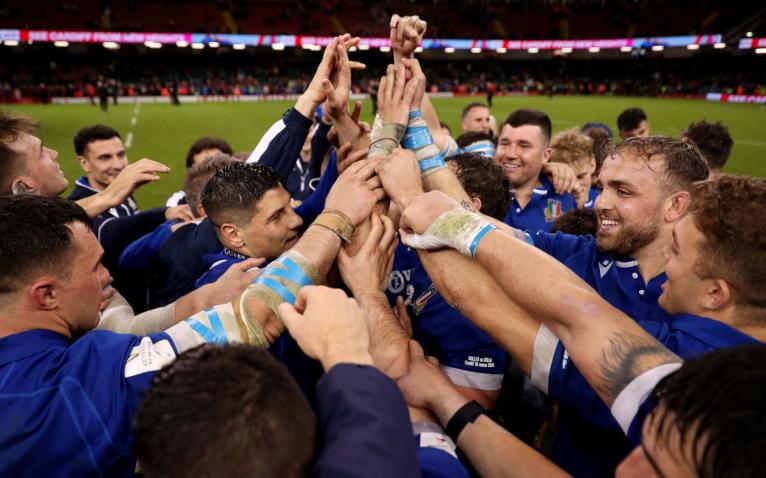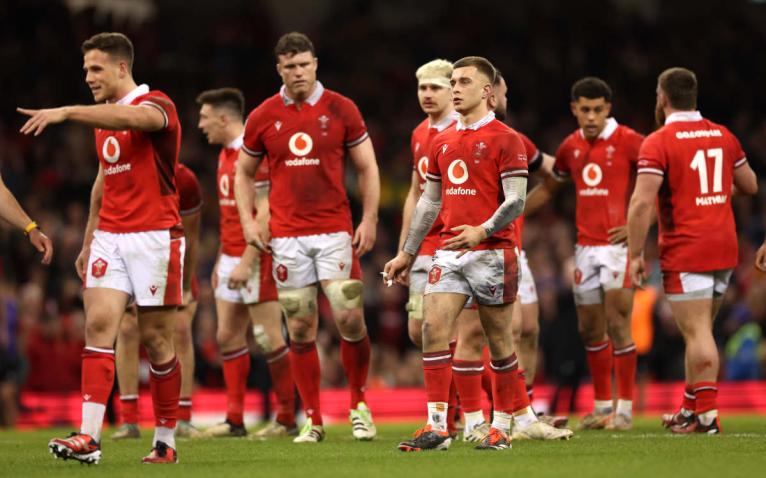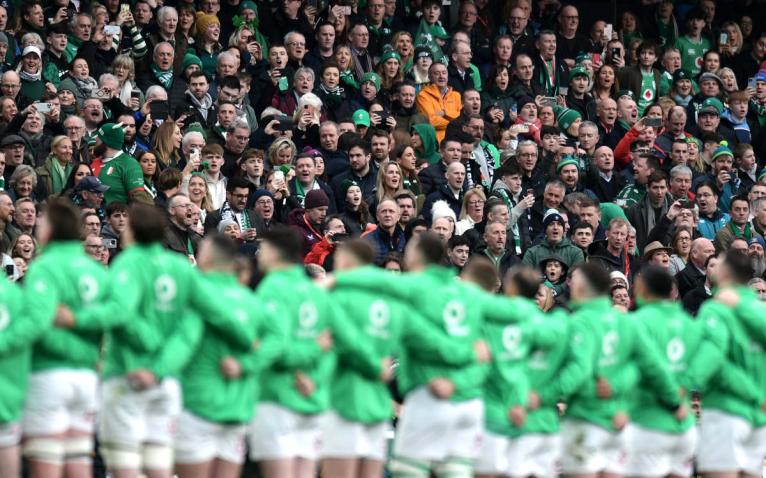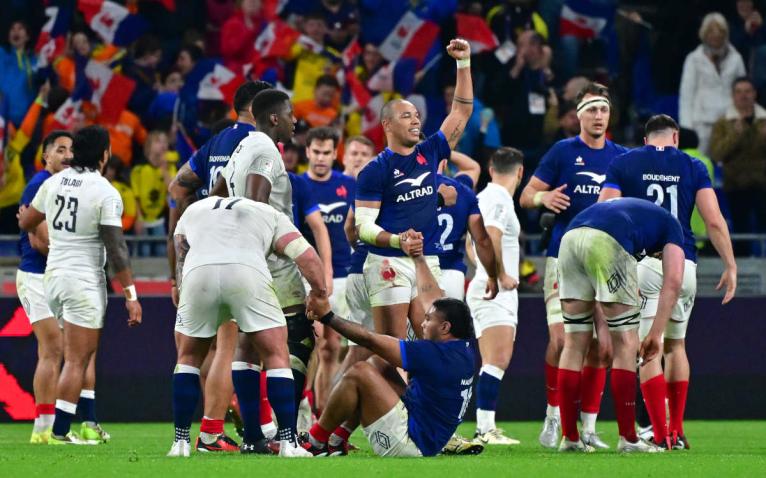Something for everyone in this year’s Six Nations; the Championship trophy to Ireland (for topping the log), the Calcutta Cup to Scotland (for thumping England), the Cuttitta Cup to Italy (for outlasting Scotland), the Millennium Trophy to England (for derailing Ireland), the Auld Alliance Trophy to France (for – ahem – beating Scotland) and the Wooden Spoon to Wales (for losing to absolutely everybody). No one headed home empty-handed. It was all so deliciously inclusive.
In fact, it was all so delicious full stop. The opening night in Marseille and the curtain call in Lyon were both indelible occasions and almost everything in between offered, drama, controversy, jeopardy and no shortage of excellence or endeavour. A flat-line Wales apart, nothing was linear; indeed, week on week, you simply didn’t know what you were going to get. The 2024 Six Nations was Forrest Gump’s box of chocolates.
So in the space of just seven weeks, France had a severe case of amnesia but finally recovered their wits; ugly duckling England morphed into a rather striking swan; Scotland were up and down like a whore’s drawers and even Ireland found it tough in the final stretch to maintain the blistering pace they’d set in the opening laps. The headliners, though, were Italy; historically, the plus one to the five. Yet, indisputably, finally, wonderfully – and as AA Milne once put it – Now We Are Six.
The Azzurri limped into this year’s Six Nations’ steeplechase like a lame horse, flogged in the World Cup by New Zealand and France, the reins in new hands and with next to no time to get out on the gallops. Yet they were a whisker away from turning over England, only a witch’s curse prevented them from knocking over France in Lille and they were worthy winners against both Scotland and Wales. Lord knows, it’s taken a while but they’ve finally arrived; truly, the longest part of travelling is the waiting.

Gonzalo Quesada appears to have welded some brains and balance – in short, some game management – to the unshakeable belief and the innate brio; compostezza – composure – is the watchword. Defensively, they made more tackles than anyone in the tournament – Michele Lamaro led the count on completed and dominant hits – and turned over more ball than anyone in the tournament – their front row, back row and centres are harder to shift at the breakdown than wheel-clamps. Federico Ruzza, by several miles, topped the line-out statistics – 33 takes plus two steals – and Tommaso Menoncello and Nacho Brex won three Player of the Match awards between them.
Understandably, their pizza-hatted, gladiator-garbed tifosi have lapped up every second. Paolo Garbisi conducted the orchestra with real aplomb – he urgently needs a new kicking tee but not too much else – and no one made more offloads than Monty Ioane. True, Italy scored the fewest tries in the tournament but the quality made up for the quantity; eight backs supplying all of their nine tries, every one of which was a small work of art.
Ange Capuozzo was invalided out of Cardiff yet Lorenzo Pani stepped in, played a symphony of a game and scored a breath-taking try in Capuozzo Corner. You don’t need to be born in Bologna to find all of this joyously uplifting.
Quesada is also building depth. The bench now bristles, Ross Vintcent and Louis Lynagh look set for meaty Test careers and Italy have the promise of an U20s outfit that’s been upending furniture for two straight years. Put it this way, Ange Capuozzo was invalided out of Cardiff yet Lorenzo Pani stepped in, played a symphony of a game and scored a breath-taking try in Capuozzo Corner. You don’t need to be born in Bologna to find all of this joyously uplifting.
Compare and contrast with Wales, where Head Coach, Warren Gatland, uniquely in Six Nations’ history, has now presided over both a Grand Slam and a Grand Slap. Apparently, he offered to resign in Saturday’s immediate aftermath and was told by the WRU CEO, Abi Tierney, that this was the last thing she wanted, a – presumably; I don’t know – private conversation which Gatland then shared with the assembled media. Rarely, if ever, has the post-tournament review of a Head Coach’s performance been wrapped up quite so smartly. ‘Sounds like any other day in Welsh rugby’, said a rueful Dan Biggar.

Gatland, clearly, has a lengthy list of well-documented mitigations but his team look as though they’re trying to feed raw oysters into a parking meter; certainly, what’ll infuriate the exasperated, Welsh supporters – by now, understandably, deaf to all pleadings and excuses – is that their team got worse the longer the tournament went on. ‘Italy look better organised and better coached,’ said Jonathan Davies in his BBC commentary on Saturday and, certainly, in a tortuous first half, Wales were utterly befuddled. All tournament they’ve struggled to find the gain-line, let alone get over it, selection has been a discordant hokey-cokey and substitutions, at times, just baffling.
The lengthy periods of pointlessness have been almost inexplicable. Wales scored nothing in the first 47 minutes against Scotland; nor in the last 42 minutes against England; nor in the first 42 minutes against Ireland, nor in the last 36 minutes against France nor in the first 64 minutes against Italy. There’ve been times in this tournament when the Principality Stadium has sounded quieter than the Reading Room at Cardiff Central Library. Depression, as they say, is where you finally run out of words.
Ireland – decisively, deservedly – were the tournament toppers, although there were signs in their final two games that opposition defences were finding ways to jam sticks into their free-wheeling spokes.
Next up, of course, is South Africa – it scarcely bears thinking about – followed by a two-Test series in Australia. You sense more pain than gain. On the upside, Tommy Reffell’s spent an almost illicit seven weeks mugging everyone at the breakdown and Dafydd Jenkins has been an absolute workhorse. That said, Wales are at Ground Zero whichever direction you look; all this and their Princess is nowhere to be seen. This is not the stuff of fairy tales.
Ireland – decisively, deservedly – were the tournament toppers, although there were signs in their final two games that opposition defences were finding ways to jam sticks into their free-wheeling spokes. I’d have liked a closer look at Andrew Porter’s trundle of a try against Scotland but, then again, if Andrew says it was down, I ain’t arguing with him. Separating a prop from a try is like stealing a slab of steak from a pitbull terrier.
But it was a fitting occasion for the outstanding Tadhg Bierne’s 50th – signature – blue scrum-cap, although the burning question in Dublin was whether the Scotland game was Peter O’Mahony’s final bow. ‘I’ve a few chats to have … but if it was my last, it wasn’t a bad one to go out on,’ he said. ‘It’s been one of the toughest weeks of my career’.

Circumstantial evidence can be misleading but his tears at the anthem and the family snapshots in the aftermath seemed to tell a tale. And if O’Mahony knew more than he was letting on last week, then how very, very typical of the man not to intrude in the run-up to such a consequential game for his team and his country. Mind you, the snarling so-and-so would be worth his weight in gold as Ireland tour South Africa this summer so perhaps it was just a farewell to Dublin. If so, it was a grand goodbye.
Scotland remain the Sisyphus of the Six Nations. As grittily as they defended, they gifted Ireland a freebie seven in Dublin and missed a Triple Crown by four points; they scored a try-bonus point in Rome and lost by two while the French game at Murrayfield still feels like twilight robbery. Indeed, had that one TMO call gone their way, they’d have swapped places with France in the final table and chalked up their best Six Nations’ finish. The margins were excruciatingly small.
Certainly, fortune was French this year; I have no idea how they finished second. They beat England simply because they happened to be sitting on the chair when the music finally stopped playing and they avoided defeat against both Scotland and Italy in almost freakish circumstances; effectively, Russian roulette with a fully-loaded revolver up against their têtes only for the trigger to jam. Twice. They didn’t quite have all the luck going in this tournament but they certainly had Scotland’s fair share.
Shaun Edwards pulled no punches in Saturday’s TV debrief in Lyon: ‘Probably the worst defensive performance since I’ve been here,’ he growled. But, in truth, the Blue Wall has needed repointing for a while now
Shaun Edwards pulled no punches in Saturday’s TV debrief in Lyon: ‘Probably the worst defensive performance since I’ve been here,’ he growled. But, in truth, the Blue Wall has needed repointing for a while now; in France’s last six matches, South Africa scored four tries, Ireland five, Wales three and England four. What’s more, three of those games were at home.
Thomas Ramos bailed them out right, left and centre – literally so; 28 shots, 25 on target – and Nolann Le Garrec spent the first three games on the bench when even a canard could see he should’ve started. France were plumb last in turnovers won – usually their superpower – and needlessly copped both of the tournament’s red cards. Quite comfortably, they could’ve finished fifth and not had a leg to stand on.

And finally, England, who, not before time, seem to have found their DNA or, perhaps more accurately, learnt how to stop over-thinking and trust their instincts. ‘Your sub-conscious is an expert; your conscious is an idiot,’ Anthony Sher was advised when, late into his illustrious career, he was fretting about playing Falstaff at the RSC. ‘So trust your sub-conscious.’ In this sense, England appear to have found their Fat Knight.
The result in Lyon on Saturday will sting but it shouldn’t. Yes, every point France scored was born of an English error – overthrown lineouts, defensive misreads, cheap penalties – but the points England scored were sublime and their cussed intensity – their sheer stickability – was inspiring. Thirteen tries in the tournament and eleven from the three-quarters? What odds would you have got back in February on England’s toothless attack chalking up those sorts of numbers?
The abuse thrown at Borthwick was an affront and hats off to the man for confounding the sneers, the sourness and the spite.
Steve Borthwick will doubtless wonder why his team kept turning up in the dressing room at half-time in arrears but, otherwise, he has every right to raise two fingers to his keyboard critics. Barack Obama was once asked what it was like running for the Presidency; ‘it’s like having a daily colonoscopy,’ he said and certainly the external pressure of running a Test team – indeed, any team – can sometimes feel the same. But the abuse thrown at Borthwick was an affront and hats off to the man for confounding the sneers, the sourness and the spite.
And England haven’t discovered just a collective but individuals to fit seamlessly into it. George Furbank, Tommy Freeman and Manny Feyi-Waboso have all been spectacularly unleashed by a supposedly ‘data-driven, head-in-the-sand, hoof and hope’ Head Coach; Ollie Lawrence, George Martin, Alex Mitchell and Ollie Chessum have kicked on from the World Cup and, when you knit that lot into a pattern alongside the consistent excellence of Jamie George, Maro Itoje, Ben Earl and George Ford, you have a, potentially, a totem pole team. And that’s before you even mention the likes of Marcus Smith, Finn Smith, Freddie Steward, Chandler Cunningham-South, Theo Dan or Ethan Roots.

If there’s a long-term concern about depth, it’ll could well be at prop. But lurking in England’s unbeaten, Championship-winning U20s – their seven-try 31-45 win in Pau last Friday night having been 21-5 down was an exhilaration – are the likes of Asher Opuku-Fordjour, Billy Sela, Scott Kirk and Jimmy Halliwell, who are all junkyard dogs ripe for future exploits and mighty enterprises. Opuku-Fordjour, in particular, looks an absolute specimen.


Thanks Graham, nice article. We left Azzurri two -three years ago with a 30-35 yo team. Tired, old school and depress players with so many wooden spoon on their backs. This restart begun in 2016, with the rebuild of the squad from the under 20 level. That’s why we ain’t got a 5 plus 1 Nations until now. Now Italy has a 35 good to top players and a Under 20 and 19 that could compete with anybody. But hats off to Quesada who overturned their minds, with a good staff (aka: Azzurri can now compete in every pitch side for 80 minutes and more) and a clear game plan.
A bit complicated, as usual, for my questionable level of English, but equally delicious to read.
Outstanding article, Graham. Agree with all of it. And enjoy the style of writing too (particularly Grand Slap!).